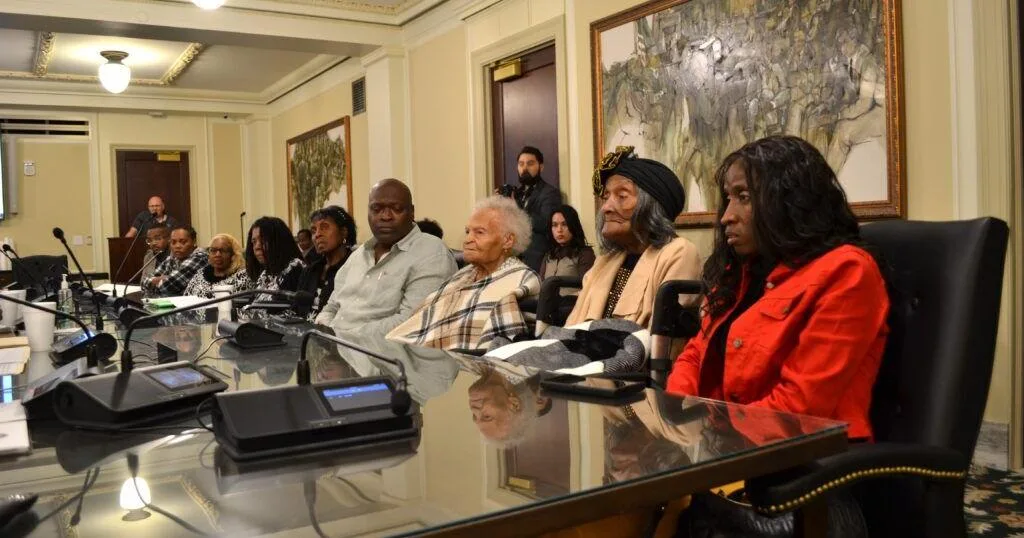
The question of reparations for people who had their lands stolen, were killed for their religion, or sold into slavery has been debated since after the Civil War, with cases brought forward to have individuals compensated for loss of wages and land due to slavery.
An historical timeline created by author Allen J. Davis and available from the University of Massachusetts Amherst Public Library, gives a timeline of reparations given beginning in 1924 with the Pueblo Lands Act.
The Pueblo tribe received $1,300,000 for the land they lost, an amount they disputed. In 1927, the Shoshones were awarded $6 million, which was said to be half the value of the land. With the passage of the Indian Reorganization Act in 1934, $2 million was set aside for the acquisition of land for Natives, and up until 1941, with a total of $5.5 million appropriated for 400,000 acres of land. Aside from the money, 875,000 acres were added to reservations. Two million acres of grazing and land intended for homesteading were given back to the tribes.
Similar legislation dealt with reparations, apologies for involvement in the slave trade, funds set up for scholarships for those who suffered in the 1921 massacre in Tulsa – all the way to present day. The last noted reparation was given in 2022 for the Bruce family in Manhattan Beach, California. In 1924, the African American family’s land was seized by eminent domain by the city for a park. In 2022, the land was returned to the descendants, who then sold it back to the county for $20 million. This historical documentation can be viewed at https://guides.library.umass.edu/reparations.
An exhaustive list of reparations outlines all of the efforts to “pay back” to those who have been wronged.
Yolette Ross, chair of the Cherokee County Democratic Party, doesn’t believe reparations can right the wrongs that have affected so many people.
“Who will get it? Who will administer it?” Ross said. “How do you individually give out money to people?”
Carol Sneed-Jalbert, chair of the Cherokee County Republican Party, did not respond to the question by press time.
Victoria Holland, congressional delegate designate for the United Keetoowah Band, addressed the question.
“It’s not a secret that Native Americans have historically been wronged, and often still feel the effects of that today. Unfortunately, we cannot change the past and what happened; we can only move forward,” Holland said. “It’s important that we work together for the betterment of all of our community members.”
One way repatriation can be accomplished is by having Congress keep its promises that have been made to tribes, Holland said.
“For example, the UKB under the treaties of Hopewell and New Echota are promised a delegate for the Cherokee people,” Holland said.
On the local level, Holland said, the state of Oklahoma should also recognize that the tribes have inherent sovereignty.
State Sen. Blake Cowboy Stephens, R-District 3, said he will do whatever he can to help make the state more prosperous.
“I proudly support bettering the lives of all Oklahomans, no matter their heritage, which is why I recently voted in favor of extending the tribal compacts in special session that will benefit the state and our tribal partners,” Stephens said.
State Sen. Tom Woods, R-District 4, said he did not have a comment on this issue.
State Sen. Dewayne Pemberton, R-District 9, is out of state and unable to comment on the question.
State Rep. Bob Ed Culver, R-District 4, did not respond to the question by press time.
On the TDP Saturday Forum on Facebook Nov. 18, the question was posed, “Should local, state or federal governments give reparations to groups of people who have been wronged in the past?”
Arthur Boudleaux Moore said “no reparations.”
“Why not go forward instead of dwelling on the past? Also, why penalize the living [with] taxes for the wrongs of those dead>” Moore said. “[It] would just stir up and cement resentment.”
Devin Gordon, a Tahlequah resident, believes some cases from the past should be compensated.
“Cases from the past where real property was taken from people and generational wealth was stolen in the process should be repaid at the current values to the family which suffered the loss,” Gordon said.
What you said
An informal poll on the TDP website asked about reparations for folks who have been wronged in the past. The one that garnered the most responses brought in 62.5%, with “absolutely not”; 18.8% said “yes, absolutely, for any of them”; 6.2% answered “yes, but not for individuals, only for groups”; 6.3% voted “no, unless it goes to a vote of the people”; and 6.3% are undecided about the question.


